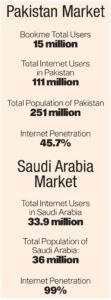When you open Bookme’s website today, the most obvious change that you will notice is in its brand identity: what was once Bookme.pk is now Bookme. This rebranding reflects a shift in outlook. The company, which began as a domestic ticketing platform, is positioning itself for recognition in multiple markets rather than being seen only as a Pakistani service.
Over the course of a decade, Bookme grew from a small startup to Pakistan’s most widely used digital ticketing platform. Its app and website cater to millions of users, offering everything from bus reservations and cinema tickets to flight bookings and event passes. For many urban Pakistanis, especially young travelers, students, and families on the move, Bookme became the quiet solution to an everyday problem of saving time. Today, the company’s ambitions stretch far beyond bus terminals and box offices. In fact, Bookme is now actively reshaping its identity, transforming from a domestic ticketing service into a global digital travel player.
In this journey, Bookme has received an acquisition offer, rejected it and is currently reviewing another. It has cemented partnerships across borders as it looks forward to an era of exponential growth.
The Saudi launchpad
When Faizan Aslam first set out to build Bookme in Lahore back in 2014, few could have predicted just how quickly it would become a household name. At that time, Pakistan’s digital landscape was still finding its feet. Internet usage was limited, eCommerce was little more than an experiment, and banks clung to paper-based systems as though the digital revolution was still decades away. Yet, in the stubborn gaps of an underdeveloped digital economy, the CEO of Bookme saw a possibility. That of expanding Bookme’s footprint abroad.
That pivot took a decisive turn when the company received an invitation to a major conference in Saudi Arabia. Having seen an earlier death after a short stint in Myanmar, Faizan says he was wary of expanding into the Middle East but did so eventually because of an offer for partnership. One that would have made their entry into the Middle East easy and cost effective. In fact Bookme is now expanding into the region using partnerships as a go-to-market strategy to even expand into the African market.

The decision to enter into the Saudi market was difficult. One would even question whether this is a sensible decision given that Bookme’s current market, Pakistan, is still unconquered. Bookme’s user base in Pakistan is around 15 million. Different organisations have attempted to solve the question of how many internet users there are in Pakistan. Most agree that it is somewhere between 38-54%. That would still mean a vast market is still untapped. On the other hand, the Saudi population is only 36 million people, with local competition like Almosafer and Almatar having strongholds in the country. Bookme still chose to expand.
“It was one of those moments when you realize the curve you’re standing on,” Aslam explained in conversation with Profit. “In Pakistan, adoption of online services is still slow. People hesitate, few banks still remain traditional and digital transactions make up barely twenty percent of all activity. But in Saudi Arabia, more than 90 percent of the population is already comfortable transacting online. For us, the question wasn’t if we should expand, it was how fast we could integrate.”
The Saudi connection began not only with the conference but also with strategic networking. Bookme’s leadership met with top executives, including the CFO of a major Saudi company, and quickly recognized the opportunities available in the Kingdom’s tech ecosystem. From there, partnerships began to take shape and agreements that would anchor Bookme in one of the Middle East’s most digitally advanced markets.
The contrast between Pakistan and Saudi Arabia could not be starker. In Pakistan, Bookme operates in a massive consumer market where the net margins in digital ticketing remain razor thin, ranging between 2%-3%. In Saudi Arabia, on the other hand, the population may be smaller, but the margins are healthier, between 7 to 9 per cent, and digital trust is already built into everyday life. This divergence is precisely what has convinced Aslam and his team that Saudi Arabia can serve as a launchpad for broader international growth.
Bookme’s credibility abroad is not being built from scratch. At home, the company has already demonstrated its ability to integrate with traditional financial systems. More than 25 banks, mobile wallets or fintech companies are connected to Bookme in Pakistan, a remarkable feat in a financial sector often described as “old school.”

Many banks continue to limit themselves to basic services, but Bookme carved a niche by offering seamless connectivity and smooth transaction pathways. For Aslam, this history matters. “If we could manage integrations in Pakistan, with all its legacy systems and limitations, we can do it anywhere. That’s why we feel confident about Saudi banks and, in time, financial institutions beyond,” he says.
“In the beginning, when we had no investment but wanted to reach millions, we looked at China and drew inspiration from WeChat and Alipay. Over time, we managed to onboard most of the banks in Pakistan and only then did we realize something surprising: banks in the rest of the world still didn’t offer the kind of services we had built inside Pakistani banking apps. Whether it was the GCC, Africa, or even Europe, those integrations simply didn’t exist. That realization opened our eyes to a much larger opportunity. What started as a scaling strategy in Pakistan has now become a blueprint we believe can transform digital transactions globally. And very soon, you’ll see Bookme taking this model into other parts of the world.”
Technology is another area where Bookme has worked quietly but ambitiously. The latest version of its app is more than just a booking tool, it is an intelligent platform that detects a user’s location through IP address and defaults its offerings to the country they are in. For a traveler arriving in Riyadh, the app automatically highlights Saudi inventory. For someone opening it in Karachi, Pakistani routes and services appear.
The go-to-market partnerships
The move into Saudi Arabia has already taken concrete shape. Bookme recently partnered with flyadeal, the Kingdom’s budget airline. Even more significant is Bookme’s collaboration with Mrsool, one of Saudi Arabia’s most popular super apps with over eight million users. Known primarily as a delivery platform, Mrsool has been expanding into lifestyle services, and Bookme’s integration fits neatly into that model.
By embedding flight and hotel booking options inside Mrsool, Bookme gains access to a vast, digitally engaged audience, while Saudi users enjoy the convenience of managing deliveries and travel from a single application.
Another name on the table is Resal, another super app where early-stage collaboration is underway. Mrsool has just started to roll out Bookme services to Mrsool App users and in less than 2 weeks the entire Mrsool customer base will have access to them. “These partnerships are at the beginning, but they represent the future of how services will be delivered,” Aslam observed.
Resal is a rewards company and very popular in Saudi Arabia. Each time a Saudi customer uses the Resal app, they accumulate points. With its integration in the Resal app, these points can be redeemed by purchases on Bookme.
Still, success in Saudi Arabia is not only about numbers. For Bookme, it is also about credibility. By demonstrating its ability to partner with major players in the Gulf, the company sends a clear signal to potential partners in other regions and that is part of the bigger story.
It is currently in the process of expanding into Africa as well. In fact one of the main benefits of moving into the Middle East is the region’s affinity with the African markets. The Middle East and Africa usually come in business discussions together. Being closer, when any of Bookme’s Saudi partners expand into Africa, they will automatically allow Bookme’s expansion into Africa. For now, Bookme is in the process of entering Africa by partnering itself with a massive global conglomerate. Announcement in this regard is expected soon. If played well, it will usher in an era of exponential growth for Bookme.
Numbers testify to this. Together with Pakistan. its new partnerships are expected to bring $20 million GMV this year for Bookme. In three years, this number is expected to reach the $100 million mark – a feat few startups are able to achieve.
For Pakistanis, this transformation is noteworthy. A decade ago, the idea of a local tech company competing in regional travel markets would have seemed fanciful. Today, Bookme is not only competing but positioning itself as a bridge between South Asia and the Middle East. The company’s new app, its partnerships with Saudi super apps and its proven ability to integrate with conservative banking systems all point toward a conclusion that Bookme is no longer just a national service but an international contender.
Acquisition talks underway
Bookme’s rise has attracted the attention of global heavyweights. At one point, Bookme received a buyout offer at a $100 million valuation cap from a global ride hailing giant. Tempting as the number was, the management of Bookme politely declined. If they had gone with the $100 million offer, a few years down the line, if the company had reached a valuation higher than $100 million, the acquirers would still have paid a $100 million price for the company. The company holds bigger potential than that, and Faizan’s instinct in this regard has played out in his favour.
The company has expanded abroad, quietly setting up operations in international markets, proving that its model can “travel”. And while Bookme was taking its model abroad, a new suitor stepped forward. A global travel powerhouse with deep pockets is currently in conversation with Bookme for an acquisition at a price north of $100 million this time.
For now, negotiations continue behind closed doors but one thing is certain: what began as a local ticketing service is no longer just a local story. It is a case study which attracts attention and intrigue.
What began in Lahore as a ticketing solution has now become a platform that promises to reshape cross-border travel experiences. For a country still finding its digital footing, Bookme’s journey is a reminder that innovation often comes quietly but leaves behind sweeping change.
Bookme’s foray into Saudi Arabia reflects both the promise and the challenges of Pakistani startups going global. While its strong user base and banking integrations give it credibility, the company will need to prove that it can thrive in markets where competition is sharper, margins are higher, and consumer expectations are uncompromising.
If Bookme can translate its local resilience into international agility, it may well set a precedent for Pakistan’s tech ecosystem to look beyond borders. If it struggles, however, it may also expose the limitations of models that work locally but stumble under global competition.









